Menu
The Australian Dental Association NSW Branch (ADA NSW) is a professional association and the peak body for dentists in NSW and the ACT.
We are a member organisation and we actively help the community with advice they need on the subject of dentistry.
By promoting oral hygiene in the community, we help dentists build stronger connections, foster greater trust, and improve oral health outcomes for everyone.
We know how important it is to maintain good oral hygiene to prevent gum disease and tooth decay. Poor oral health is a contributor to major health conditions such as cardiovascular disease and diabetes.
The principal point of contact for all enquiries should be with your trusted dental practitioner.
Dental records belong to the practice where they are or were created. However, it is recognised in law that patients are entitled to access to their health information.
When seeking to obtain copies of your dental records the following applies:
The request should be made in writing to the dentist or the practice that holds the records. The written request should clearly state:
Before providing the records the dentist or practice must verify that the request is genuine and that patient privacy and confidentiality is protected against unauthorised access. For example, if you request your records be received by email and the email address you provide is different to the email address held by the practice, then additional steps may be required prior to the release of the records. Your dentist or the dental practice will be able to advise you of the specific steps required.
When providing the records, the dentist may request a meeting during which time they can also explain the records.
It is not unreasonable for a fee to be charged for copying and providing the records. If you are concerned about the application of a fee you should discuss your concerns with the practice.
Once a valid written request for records is received, a practice may take up to 45 days under legislation to provide copies of the records. Most practices however do provide these records well within this timeframe.
Often there is more than one treatment solution for a clinical concern or diagnosis and as a result a dentist might provide you with a number of “treatment options”.
In discussing treatment options, a dentist will normally explain what those options are.
A dentist might make a recommendation but ultimately it is up to each individual patient to decide what treatment is right for them considering their personal preferences, circumstances, lifestyle and budget.
If you are unsure about your options you should discuss your concerns openly with your dentist. If there is ongoing uncertainty, it is always recommended that you seek a second opinion. Your dentist could suggest or arrange a referral to another dentist or dental specialist.
If a course of treatment has been recommended and you are unsure whether it is the best option for you, you could consider a second opinion from another dentist or a dental specialist. Your dentist should be happy to provide a referral.
In some cases, a referral may be recommended by your dentist to ensure you obtain the most appropriate treatment.
Please discuss a referral with your treating dental practitioner.
There can be many reasons why a patient may have difficulties after treatment. ADA NSW recommends that you raise your concerns with the treating dentist in the first instance. If your concerns are of a clinical nature, the dentist may wish to re-examine you in order to evaluate the condition. This is often essential to determine what the problem may be and should not be a cause for concern. If the situation is complex, your dentist may wish to refer you to a specialist for a second opinion.
If you are unsure of the advice provided, you can also request a second opinion from another dentist about your condition.
If you are interested in a particular treatment and that treatment is not included as part of your treatment options, it is important to discuss this with your dentist in order to understand why it is/is not included. Ultimately a dentist cannot be compelled to provide treatment that they consider inappropriate or that is not in your best health interests or that they are not trained in and have sufficient experience to provide. If you feel that a type of treatment might be suitable for you but is not being offered by a particular practitioner, then you might choose to obtain a second opinion from another practitioner.
Fees in dentistry are generally not covered by Medicare and are not set by an external body. As a consequence each dentist is responsible for setting their own fees. Sometimes instead of an exact fee you may be quoted a range with an upper and lower cost limit. This can occur where it is difficult to predict the outcome and could be for any number of reasons. If the situation of your treatment changes mid treatment, ask your dentist if there is a change to the predicted cost.
Before embarking on treatment, you should ensure you are informed on the cost of care, and that you are happy to proceed with the treatment as quoted. If affordability is a concern, some dentists may be able to make special arrangements (such as a payment plan or staged treatment) in order to spread out costs over time. However, this may depend on the policies of the practice, and may not always be available.
If you are unsure of the cost you have been quoted feel free to discuss this with the dentist or seek a second opinion. However, it is important to note that a quote can only be provided after an appropriate examination and usually cannot be made over the phone. There are likely to be further costs involved in gaining that second opinion from another dentist.
Many people are comfortable asking family, friends or other trusted health professionals or performing an internet search to locate a dentist or dental specialist.
Often, we are asked to recommend someone. Unfortunately, ADA NSW cannot recommend a particular dentist. In these cases, we encourage interested persons to ask people they know and trust to give them a direct recommendation.
Alternatively, you can search using the ADA ‘Find a Dentist’ resource.
In order to be eligible for public dental treatment in NSW, you must be:
OR
More information can be found by visiting the following site:
www.health.nsw.gov.au/oralhealth/Pages/info-patients.aspx
Contact your Local Area Health Service to find out more:
https://www.health.nsw.gov.au/oralhealth/Pages/contact-a-service.aspx
ADA NSW considers community water fluoridation as a safe, effective and equitable means of preventing dental decay in children, adolescents and adults. The fluoridation of community water supplies is an effective way to deliver fluoride to all members of the community, regardless of age, individual motivation or socioeconomic status.
As early as the 1950s, reputable scientific, health and health-related professional organisations throughout the world recognised the importance of water fluoridation due to the oral health and economic benefits that resulted. The following organisations have repeatedly endorsed fluoridation of drinking water as a desirable public health policy based on numerous scientific studies carried out throughout the world.
In Australia this includes:
National Health and Medical Research Council (NHMRC), Australian Dental Association, Australian Medical Association, Public Health Association of Australia, Royal Australasian College of Physicians, The Royal Flying Doctor Service, Australian Academy of Science, Australian Centre for Human Health Risk Assessment, Osteoporosis Australia, Arthritis Australia, Kidney Health Australia, Australasian Academy of Paediatric Dentistry, National Rural Health Alliance.
Internationally this includes:
World Health Organisation, United States Public Health Service, Centers for Disease Control and Prevention (US), International Association of Dental Research, FDI World Dental Federation, Royal College of Surgeons (UK), Royal College of Physicians (UK), American Academy of Paediatrics.
Dentistry is a regulated profession, meaning that there are strict rules that apply on who can practice.
Dentists are individuals who have undergone an approved course of university study (typically 4-5 years) and passed examinations that qualify them to practice dentistry. Dentistry involves assessing, preventing, diagnosing, advising on, and treating any injuries, diseases, deficiencies, deformities or lesions on or of the human teeth, mouth or jaws or associated structures.
Dental specialists are dentists who have undertaken and successfully completed an additional course of approved study (typically 3 years) in their chosen field of dentistry.
There are 13 dental specialties, these are:
Dentistry involves assessing, preventing, diagnosing, advising on, and treating any injuries, diseases, deficiencies, deformities or lesions on or of the human teeth, mouth or jaws or associated structures.
All dentists can work within this definition. However, as the definition is broad dentists often limit themselves to particular procedures and services. This decision can be based on their professional interests, professional experience and any additional training they may have undertaken. This is the reason why a dentist may sometimes recommend referral of a patient to another practitioner or to a dental specialist.
Asking is the most direct way to verify whether your dentist is a registered general dentist or a registered specialist dentist.
You can also check the Australian Health Practitioner Regulation Agency (AHPRA) register. This is a public register and can be accessed by members of the community at the following website: www.ahpra.gov.au/Registration/Registers-of-Practitioners.aspx
In the same way as checking if your dentist is a dental specialist, check the Australian Health Practitioner Regulation Agency (AHPRA) register. This is a public register and can be accessed by anyone at the following website: www.ahpra.gov.au/Registration/Registers-of-Practitioners.aspx
Want to find out more about careers in dentistry? Career paths and the requirements necessary for each position are listed by job title below.
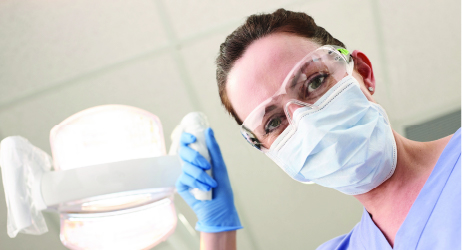
Dentistry is a rewarding profession based on helping others. It is also an ethical profession, and practising dentists are expected to place the health and welfare of their patients before any other considerations. Dentists also have an important role in leading the oral health team.
A dentist is a registered primary healthcare professional who is highly educated and specialised in the care of the teeth and their supporting structures including the orofacial region. Dentists help people to maintain and improve their oral health. As oral health can have important implications for general health, quality of life and aesthetics, dentists have an important role in maintaining the wellbeing of their patients.
A career in dentistry affords a range of employment opportunities including:
In the clinical team, the dentist has a responsibility, as the team leader, to ensure sound professional standards are maintained.
A career in dentistry would be a good position for you if you:
Dental schools in Australian universities grant Bachelor or Doctoral degrees. There are nine universities in Australia that provide training to prospective dentists. Although the post-nominal letters can vary from one institution to the next (for example, DMD, BDS, BDSc, BDent), these qualifications all allow graduating students to register as dentists at the completion of their training.
As part of dental services, a dentist may:
Dentistry has an important surgical component, Improvements in dental technology over time allow dentists to provide painless and effective treatment to their patients if surgical intervention is required.
Dentistry is also increasingly focused on stopping the onset of oral disease through education, behavioural change and preventative care.
A dentist must practise under legislative regulations much like other registered health professionals such as nurses, physicians, pharmacists, physical therapists, optometrists, osteopaths, chiropractors and psychologists.
Registration to practise a dentistry job in Australia requires evidence of the successful completion of an accredited university dental degree. It is expected that after dentists graduate, they will continue to update their learning throughout their career to ensure they are providing up-to-date, evidence-based care. As part of registration requirements, dentists must complete at least 60 hours of continuing professional development in a three-year period.
The process of registration represents the strongest form of protection for the public from unqualified individuals and unsafe practices. It is illegal to practise dentistry without registering with AHPRA (administered by the Dental Board of Australia) and violation of the law is punishable by conviction and fine.
Once registration is granted, it must be renewed annually and you must declare that you remain fit to practise. Consideration of criminal history, health and education are important elements in the consideration of your registration renewal application each year.
Are you considering a career as a dentist?
How do you become a dentist in NSW?
To become a qualified dentist and achieve a dental career, you must complete rigorous academic and professional requirements. There are two dental faculties in New South Wales that provide the qualifications necessary to register as a dentist in Australia, and they are based in the University of Sydney and Charles Sturt University.
The University of Sydney
USyd offers two pathways for graduation as a dentist:
Doctor of Dental Medicine – graduate entry
Double Degree Dentistry (Bachelor of Science (Advanced) followed by a Doctor of Dental Medicine) – for high school leavers with outstanding results
The Doctor of Dental Medicine degree requires four years of full-time study and can only be accessed after successful completion of a Bachelors degree (minimum three years of study).
More information on the University of Sydney
Charles Sturt University
CSU School of Dentistry and Health Sciences, Orange, offers a Bachelor of Dental Science in Dentistry. This is a five-year undergraduate degree.
More information on studying dentistry at CSU
Interstate University Websites
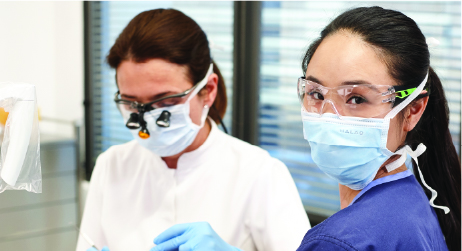
Dental Assistants provide support to a range of oral health professionals such as dentists, dental hygienists, oral health therapists and dental specialists.
A REWARDING CAREER
NO TWO DAYS ARE THE SAME
Things to know if you are considering a dental assistance career:
If you are interested in dental assisting:
Where do I get more information?
Speak to your local dental practice to learn more about working in a dental practice as a career. Search for dental assistant jobs in your favourite job seeking website.
If you’re still at school, speak to your school careers advisor.
Some helpful websites:

Oral health therapists provide high quality oral health care including examinaton, treatment and prevention. Oral Health Therapists have a strong preventive focus and help promote positive oral health.
Oral Health Therapists (combined dental therapists and hygienists) are registered oral health practitioners who provide primary oral health care for children and adults. This includes examining and diagnosing dental decay and gum diseases and providing routine dental treatments. They also promote oral health and provide preventive dental services among individuals and the broader community.
Oral health therapists’ tasks can include:
Oral Health therapists who work in the public sector may be required to work anywhere in their state or territory. Individual preferences and applications for specific positions are taken into account however.
If you are considering an oral health therapist career you should:
Where do I get more information?
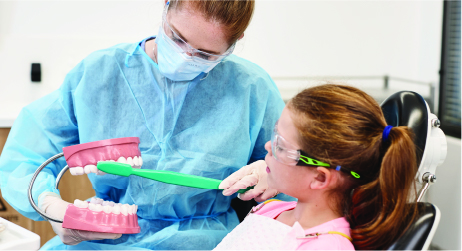
Dental hygienists work together with the dental team in treating patients. They use preventive, educational and therapeutic methods for the control of oral diseases to aid individual patients and groups in achieving and maintaining oral health. They are trained to do specific clinical procedures which aim to prevent dental disease as part of the dental team.
A dental hygienist is a registered dental practitioner who provides highly skilled preventive services on all age groups. As a clinician they work as part of the dental team to determine therapeutic treatment for each individual patient, but work independently in delivering their dental services. They work within a team environment to assure best practice in providing safe and appropriate dental healthcare.
A dental hygienist career would be a good dentistry position for you if you have good time management (efficient), apply attention to detail and precision (accurate) and possess good hand-eye coordination and manual dexterity. In addition, if you find being a good listener with sensitivity to the needs of others as personally rewarding, you have some of the qualities that make you well suited to be a dental hygienist.
A dental hygienist’s clinical role includes a variety of duties that are focused on diagnostic, therapeutic and preventive duties to support total health for the control of oral diseases.
As part of dental hygiene services, a dental hygienist career in New South Wales may include:
Dental hygienists use their knowledge and clinical skills to provide dental hygiene care and their interpersonal skills to motivate and instruct patients on methods tailored to preventing oral disease and maintaining oral health.
If you are considering a dental hygienist career you should:
Where do I get more information?
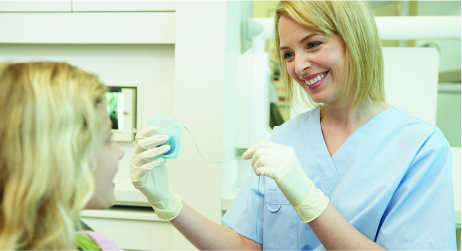
Dental therapists examine and treat diseases of the teeth in children, adolescents and some adults as part of the dental team. The dentistry work performed is varied from identifying the disease risk of the child, providing professionally applied preventive treatments, carrying out simple restorative work in primary and permanent teeth, through to the extraction of teeth under local anaesthetic, and the initial management of trauma. The national law regulates the practice of dental therapists and they are expected to only perform dental treatment for which they have been educated and trained and in which they are competent.
A dental therapist is a registered primary healthcare professional that provides restorative and preventive dental services to children, adolescents and teenagers. As a clinician, the dental therapist is required to recognise oral conditions, plan and deliver reparative dental treatment, evaluate care and make appropriate referrals to a dentist for complex dentistry. Dental therapists work within a team environment in both clinical practice and population-based oral health promotions to assure best practice in providing safe dental healthcare and positive oral health outcomes.
A dental therapist career would be a good dentistry position for you if you have good time management (efficient), apply attention to detail and precision (accurate), possess good eye-hand coordination, manual dexterity and an artistic ability to construct form and design. In addition, if you have well developed communication and cultural sensitivity skills you have some of the qualities that make you well suited to pursue a dental therapist job.
As part of clinical dental therapy services, a dental therapist career in New South Wales may include:
The dental therapist’s key roles are in community dentistry and program support activities. Complex cases that fall outside the boundaries of the dental therapist’s skill range are referred for diagnosis and treatment by a dentist.
Dental therapists provide essential dental treatment on children to improve, prevent and promote oral health wellness. These actions involve the acquisition of knowledge through consultation, perception and examination and may be provided in independent, interdependent and collaborative relationships with the patient, their parents and the health care team.
A dental therapy career offers personal satisfaction in providing valuable oral health care services and developing trusting relationships with patients. Flexible work schedules make balancing work and lifestyle needs very achievable.
If you are considering a dental therapist career you should:
Where do I get more information?
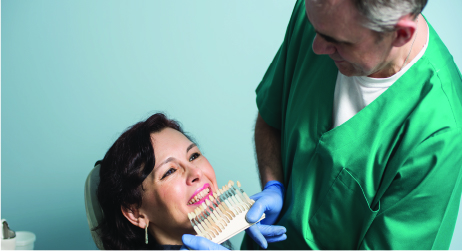
Dental prosthetists are registered practitioners who work independently to provide complete and partial dentures and mouthguards to the public. To become a dental prosthetist you must have already trained as a dental technician.
Dental prosthetists have expanded their dentistry career within the technical environment to include a more patient-oriented direction. Dental prosthetists make independent and critical judgments that together with their highly developed skills in appliance design and construction allows them to offer tooth replacement and protective solutions for their patients.
A dental prosthetist is registered by the Australian Health Practitioners Registration Agency.
Dental prosthetists are nationally registered primary healthcare professionals who are qualified dental technicians and have completed further dental studies in order to have direct patient contact for the construction and maintenance of removable dentures and sports mouthguards.
Dental Prosthetists have either an Advanced Diploma in Dental Prosthetics or a Bachelor of Oral Health in Dental Prosthetics.
A dental prosthetist’s clinical role is focused on diagnostic, preventive and fabrication duties to provide a complete removable prosthetic service for the replacement and protection of natural teeth.
Dental prosthetists have achieved versatile clinical and technical skills to replace or protect tooth function while preserving the oral soft and hard tissues that support the removable dental prosthesis. They are highly knowledgeable of the appropriate methods to construct oral appliances from a variety of materials.
If you are considering a dental prosthetist career you should:
A dental prosthetist career would be a good dentistry position for you if you like working with tools and equipment, can apply a high level of attention to detail and precision (accurate), have good time management and possess good hand-eye coordination and manual dexterity. In addition, if you have an artistic ability to construct, form and design and find being a good listener with sensitivity to the needs of others as personally rewarding, you have some qualities that make you well suited to pursue a dental prosthetist career.
Where do I get more information?
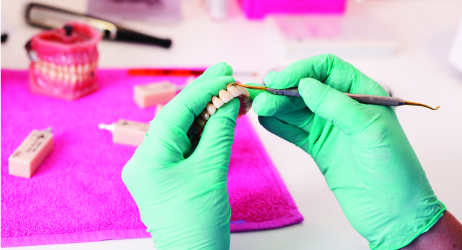
Dental technicians construct and repair dentures (false teeth) and other dental appliances including crowns and bridges. Dental technicians work closely with dentists and dental prosthetists in the construction, modification and repair of dentures and other dental appliances.
Dental technicians are required to comply with TGA regulations as devices they manufacture are classified by the TGA as custom made medical devices, whether made locally or imported.
A dental technician (or dental mechanic) is an essential member of the dental team who is highly skilled in the design, construction, repair and adjustment of various dental appliances. They are non-registered professionals who work from a written prescription and direct communication with the dental prosthetist, dentist or specialist dentist. The combined expertise of the technician and practitioner is needed to ensure that quality outcomes are achieved for the patients.
The dental technician’s role includes a variety of duties around the fabrication of fixed and removable dental appliances. They work closely with the practitioner and only have direct contact with the patient for the purpose of assessing an accurate colour shade for maximum aesthetics.
As part of dental laboratory services, a dental technician career in New South Wales may include:
The dental technician can specialise their work to one or more areas of dentistry, such as:
Dental technicians use a high degree of technical ability, training and skills that involve diverse techniques including plaster casting, electro-spot welding, metal casting, metal polishing, wax modelling, ceramics, wire bending, electroplating and sandblasting. They are highly knowledgeable of the appropriate methods to construct a wide range of items and how to deal with the variety of materials.
A dental technician career would be a good dentistry position for you if you like working with tools and equipment, can apply a high level of attention to detail and precision (accuracy), have good time management (efficient) and possess good eye-hand coordination and manual dexterity. In addition, if you have an artistic ability to construct form and design you could suit a dental technician career.
If you are considering a dental technician career you should:
Where do I get more information?
Available: Monday to Wednesday, 9am-5pm
Phone: (02) 8436 9900
Email: communityrelations@adansw.com.au
The Community Relations and Engagement Advisor (CREA) is available to respond to members of the community located in NSW and the ACT, who wish to contact the Australian Dental Association NSW Branch (ADA NSW) with any enquiries or issues relating to dentistry.
If you would like to speak to our CREA, please call or email ADA NSW using the above contact information. Provide some details of the enquiry, your name and a return phone number, and we will respond as soon as possible.
Please note this is a phone and email-based service only; we do not take appointments.
The best way to resolve a situation is to discuss it directly with your treating dentist. Send an email to the practice with your concerns.
ADA NSW is a member organisation and is not a regulatory or complaints body and does not investigate or make judgements on complaints related to health care.
If you cannot resolve your complaint directly with your dentist, then you can raise your concerns with the Health Care Complaints Commission.
IMPORTANT INFORMATION
CONTACT US
ADA NSW: 02 8436 9900
CPD: 02 8436 9997
Media Enquires: 02 8436 9900
Level 1, 1 Atchison Street
St Leonards, NSW 2065
LIVE
Please fill out as much detail as possible and we will respond directly.
*terms and conditions apply.